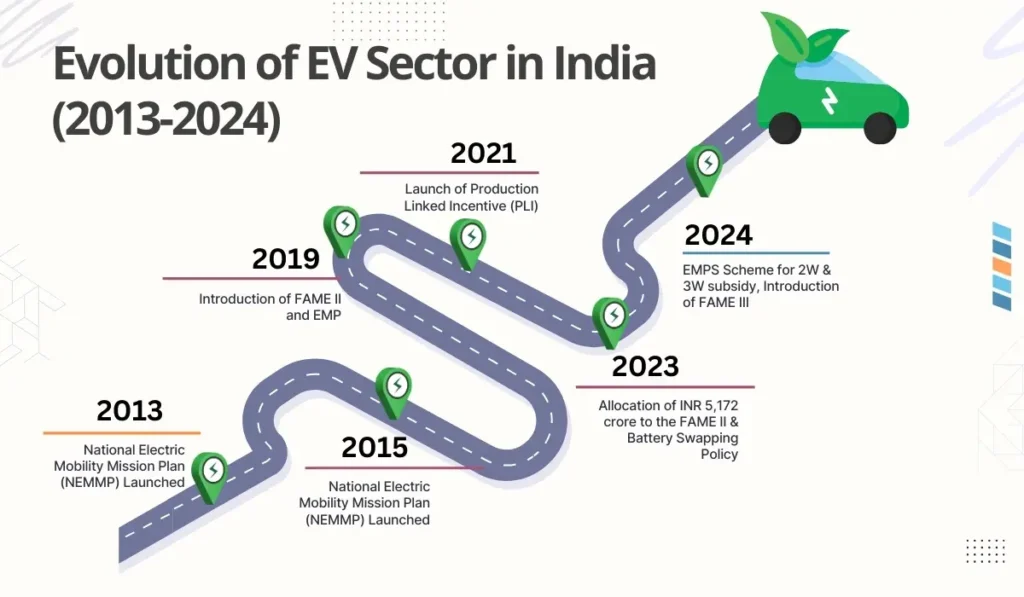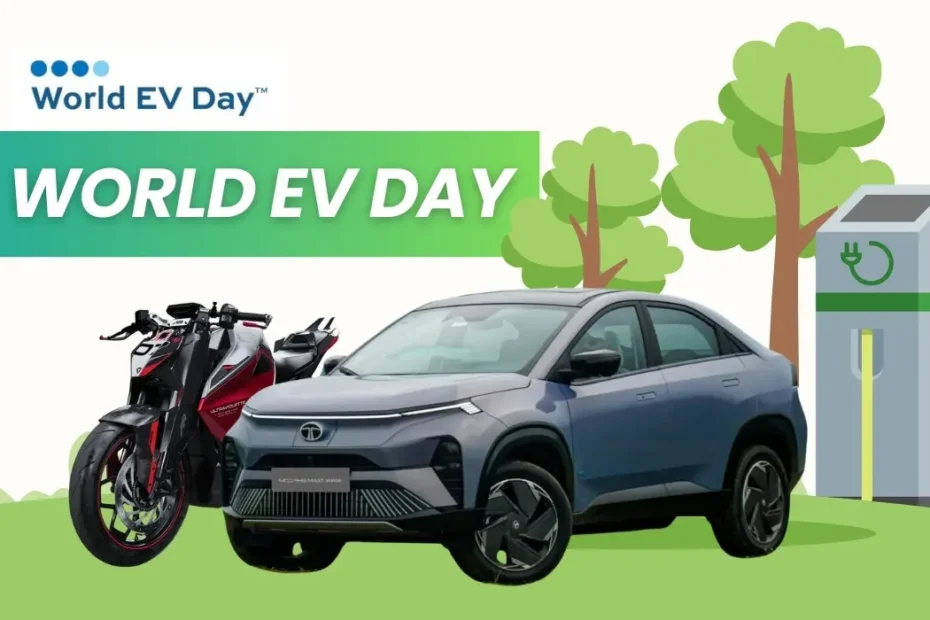As the world shifts towards sustainable Mobility, World EV Day has emerged as an important event in the movement acting as a catalyst in this transition. The year 2024 marks the fifth anniversary of this movement, highlighting the progress made in the electric vehicle sector, especially in growing markets like India. In this article, we’ll explore the history and significance of World EV Day, India’s rapid EV growth, the role of startups and major automakers, and the challenges faced by the industry.
What is World EV Day?
World EV Day is an annual event held on September 9 each year, aimed at encouraging the adoption of electric vehicles and spreading awareness about their environmental and economic advantages to the world. The day emphasizes the need for a shift toward sustainable transportation, which plays a vital role in reducing carbon emissions and combating climate change.
World EV Day is celebrated through various social media campaigns, multimedia events, and live gatherings. Each year, a specific theme is chosen to highlight key aspects of electric vehicles and their importance. For 2024, the theme is “Let’s drive change, together.”
Last year in 2023, World EV Day made a significant impact, achieving over 200 million impressions on Twitter (now known as X) across 119 countries. This year, the focus will be on encouraging businesses, policymakers, and individuals worldwide to participate in the #DriveChange movement.
History and Founders of World EV Day
World EV Day was first started in 2020 by Ade Thomas, the founder of sustainability-focused media company Green.TV, in partnership with ABB, a company known for its technology innovations including EV chargers. Since then, it has grown into a major event, attracting the attention of government officials, car manufacturers, and the public.
Significance of World EV Day
World EV Day is more than just a celebration. It plays an important role in several key areas such as:
- Raising Awareness: Educating the public about the environmental benefits of EVs, such as reducing greenhouse gas emissions and improving air quality.
- Promoting EV Adoption: Encouraging individuals and businesses to transition from traditional internal combustion engine (ICE) vehicles to electric vehicles.
- Brings People Together: Celebrated as a global movement, world EV Day brings together like-minded people from all over the world, working for the same goal of EV adoption.
- Showcasing Innovation: Highlighting advancements in EV technology, charging infrastructure, and battery development throughout the world.
- Supporting Policy Changes: Encouraging governments and organizations to announce and implement new policies that support the growth of electric mobility by making EVs more affordable for buyers and profitable for manufacturers.
Electric Vehicles and Their Evolution
Electric Vehicles, or EVs are vehicles that run on electricity stored in rechargeable batteries, which in turn powers the electric motors to propel the vehicle. They are of two types in general – Battery Electric Vehicles (BEV) which run purely on electricity, and Plug-In Hybrid Electric Vehicles (PHEVs), powered by both an electric motor and an internal combustion engine.
EVs date back to the late 19th century when one of the first electric cars “La Jamais Contente” was introduced by a French automaker. While in India, the first electric car “Lovebird” was introduced in the Auto Expo in New Delhi in 1993.
Growth of India’s Electric Vehicle Sector

India is quickly becoming a leader in the electric vehicle market with its exponential growth curve. The government’s friendly EV policies, new technologies, and rising public interest and acceptance are acting as string catalysts, helping India achieve rapid growth in the EV sector. Let’s look at how India’s EV market has evolved over the past few years
Growth in Sales
- Total EV Sales: In the 2022-23 financial year, India recorded 1.24 million EV sales, marking a 154% year-on-year (YoY) growth compared to the previous year. By the first half of 2024, EV sales had surged to 1.93 million.
- Monthly Sales Trends: Starting with 128,555 units in September 2023, EV sales reached their peak at 213,047 units in March 2024. After a small decline in April, sales picked up, with 179,039 units sold in July 2024, and 156,227 units in August.
- Category Breakdown: Electric two-wheelers (E2Ws) dominated sales in India, although their numbers fell in August 2024 to 88,472 units from 107,475 the previous month. E-rickshaws saw consistent sales at 44,336 units, while electric four-wheelers (E4Ws) sold 6,336 units in August 2024.
These figures indicate a strong community for Electric Vehicles in India, taking India all the way up to becoming a major player in the global EV industry.
Factors Driving EV Growth in India
Several factors are contributing to India’s booming EV industry, some of the major ones include:
- Government Support: Policies like FAME II (Faster Adoption and Manufacturing of Hybrid and Electric Vehicles), PLI, and EMPS offer financial incentives for manufacturers and consumers making EVs more affordable in India. India is all set to launch the FAME III EV policy after the end of FAME II and EMPS by September 31, 2024.
- Battery Innovation: Ongoing improvements in lithium-ion battery technology are extending vehicle range and lowering the purchase cost in India. PLI schemes are promoting the Indigenous manufacturing of EV battery cells in India, making EVs more affordable and driving growth.
- Charging Infrastructure Expansion: As of August 2024, India has around 26,176 AC chargers and 2,440 DC chargers. This massive expansion of public charging stations has changed the perception of skeptical range concious buyers in India, making them confident to switch to EVs.
- Awareness and Acceptance: More consumers are choosing EVs due to concerns over air pollution and climate change. Meanwhile, consumer acceptance of the change in mobility patterns due to its cost-effectiveness over the long run is also driving the growth of EVs in India.
Also Read: India’s first electric car vs the latest
Role of Startups and Major Automakers
Indian EV startups are playing a big part in pushing the industry forward. These companies are bringing fresh ideas and innovations to the market, offering buyers more options to choose from. Key startups like Ather Energy are leading with their electric scooters and a fast-charging network known as Ather Grid.
Ola Electric, on the other hand, stands out as a major player in the electric scooter market with the highest two-wheeler sales figures. Yulu addresses last-mile connectivity in cities by offering electric bikes and scooters on rent, while Altigreen specializes in commercial electric three-wheelers.
Alongside these startups, major automakers have forayed into the EV sector with new and affordable EV models. Tata Motors dominates the electric car market with a 72% share, featuring popular models like the Nexon EV, Curvv EV, Punch EV, Tigor EV, and Tiago EV.
Mahindra also contributes significantly with its electric SUV lineup, the XUV400, and plans to broaden its EV lineup with 5 new electric SUVs arriving in late 2024. Emanhile, Hyundai, and Kia cater to the luxury EV segment with their Kona and EV6 Electric.
Addressing the Challenges
Despite its growth, India’s EV industry faces several challenges, including high upfront costs, a shortage of charging infrastructure, particularly in rural areas, and range anxiety among potential EV buyers. To address these issues, the Indian government has introduced several supportive measures such as the FAME II (now FAME III incoming), which provides subsidies and helps expand charging networks, the PLI Scheme to boost local production of EV components and state-level incentives which reduces road taxes and registration fees for EVs while offering financial aid for EV charging station setup.
World EV Day reminds us why electric vehicles are key to a cleaner, greener future. It helps people understand how EVs are beneficial both economically and environmentally.
FAQs on World EV Day
World EV Day is celebrated on September 9 each year.
World EV Day is celebrated through various social media campaigns, multimedia events, and live gatherings with a special theme to focus on key aspects of EV.
The theme for World EV Day 2024 is “Let’s drive change, together.” This theme focuses on encouraging global participation in the transition to electric mobility.
